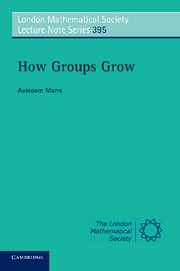Book contents
- Frontmatter
- Contents
- Preface
- 1 Introduction
- 2 Some Group Theory
- 3 Groups of Linear Growth
- 4 The Growth of Nilpotent Groups
- 5 The Growth of Soluble Groups
- 6 Linear Groups
- 7 Asymptotic Cones
- 8 Groups of Polynomial Growth
- 9 Infinitely Generated Groups
- 10 Intermediate Growth: Grigorchuk's First Group
- 11 More Groups of Intermediate Growth
- 12 Growth and Amenability
- 13 Intermediate Growth and Residual Finiteness
- 14 Explicit Calculations
- 15 The Generating Function
- 16 The Growth of Free Products
- 17 Conjugacy Growth
- 18 Research Problems
- References
- Index
12 - Growth and Amenability
Published online by Cambridge University Press: 05 January 2012
- Frontmatter
- Contents
- Preface
- 1 Introduction
- 2 Some Group Theory
- 3 Groups of Linear Growth
- 4 The Growth of Nilpotent Groups
- 5 The Growth of Soluble Groups
- 6 Linear Groups
- 7 Asymptotic Cones
- 8 Groups of Polynomial Growth
- 9 Infinitely Generated Groups
- 10 Intermediate Growth: Grigorchuk's First Group
- 11 More Groups of Intermediate Growth
- 12 Growth and Amenability
- 13 Intermediate Growth and Residual Finiteness
- 14 Explicit Calculations
- 15 The Generating Function
- 16 The Growth of Free Products
- 17 Conjugacy Growth
- 18 Research Problems
- References
- Index
Summary
Amenability and Intermediate Growth
In this chapter and the next, we explore the relation of growth to other group theoretical properties.
Definition A group G is amenable, if it is possible to define on it a non-trivial finite, finitely additive, translation-invariant measure.
That means that we can find a function µ : 2G → ℝ≥0, which associates to each subset A of G a number µ(A) ≥ 0, and which satisfies:
(1) If A, B ⊆ G and A ∩ B = ∅, then µ(A ∪ B) = µ(A) + µ(B).
(2) If A ⊆ G and x ∈ G, then µ(Ax) = µ(A).
(3) µ(G) > 0.
The difference between this notion and the more customary notions of measure, such as Lebesgue or Haar measures, is that, first, we require µ to be defined for all subsets of G, and, on the other hand, we require additivity only for finite unions, not countable ones. From here on, whenever we say “measure”, we usually mean one which satisfies properties (1)–(3) above.
Obviously multiplying µ by any positive constant yields another measure with the same properties, hence we will always assume that µ(G) = 1. We required our measure to be invariant under right translations, but we can find also a left-invariant one, by defining ν(A) = µ(A-1).
- Type
- Chapter
- Information
- How Groups Grow , pp. 121 - 130Publisher: Cambridge University PressPrint publication year: 2011



